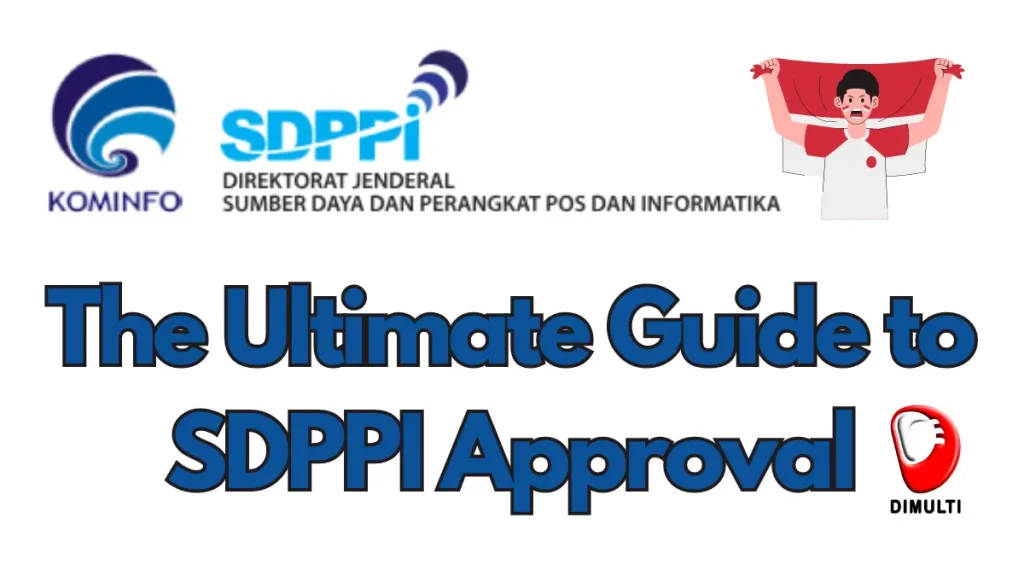Are you looking to launch your product in the Indonesian market? If so, you’ll need to obtain the SDPPI approval. But what exactly is SDPPI approval exactly and how can you navigate the process successfully?
Whether you’re a small business or a multinational corporation, ensuring compliance with SDPPI regulations is essential to legally bring your products into the Indonesian market. We will provide you with valuable insights and expert advice to help you streamline the SDPPI approval process and ensure a hassle-free experience.
In this comprehensive guide, we will walk you through everything you need to know about SDPPI approval. From understanding the importance of this certification to the specific requirements and steps involved, we’ve got you covered.
So, if you’re ready to dive into the world of SDPPI approval and unlock new opportunities in the Indonesian market, let’s get started!
Table of Contents
What is SDPPI Approval

To obtain SDPPI approval, manufacturers and importers must go through a rigorous testing and certification process to demonstrate that their products meet the necessary technical requirements. This process is essential to ensure the safety, quality, and compatibility of electronic and telecommunication devices in Indonesia.
The SDPPI (Directorate General of Resources and Equipment for Post and Information Technology) approval is a certification required for all electronic and telecommunication devices that are intended to be sold or used in Indonesia. This certification ensures that the devices comply with the national technical standards and regulations set by the Indonesian government. Without this approval, it is illegal to import, sell, or use such devices in the Indonesian market.
Why is SDPPI Approval important
SDPPI approval is of utmost importance for businesses looking to enter the Indonesian market. Here are some key reasons why obtaining this certification should be a priority:
- Legal Compliance: Without SDPPI approval, it is illegal to sell or use electronic and telecommunication devices in Indonesia. Non-compliance can lead to severe penalties, including fines and imprisonment. By obtaining SDPPI approval, businesses can ensure their products meet the necessary standards and regulations, avoiding any legal ramifications.
- Market Access: The Indonesian market is one of the largest and fastest-growing in Southeast Asia. With a population of over 270 million people, it offers immense opportunities for businesses. SDPPI approval is a prerequisite for entering this market, allowing companies to tap into its vast potential and reach a wider customer base.
- Consumer Confidence: SDPPI approval serves as a mark of quality and safety for consumers. Indonesian customers are becoming increasingly aware of the importance of using certified products. By obtaining SDPPI approval, businesses can build trust and credibility among consumers, enhancing their brand reputation in the market.
- Competitive Advantage: In a competitive business landscape, having SDPPI approval can give your company a competitive edge. It demonstrates your commitment to meeting the highest standards and differentiates your products from uncertified alternatives. This can help attract more customers and increase market share.
The process of obtaining SDPPI Approval
Obtaining SDPPI approval involves several steps that businesses need to follow. Here is a breakdown of the process:
- Determine the Product Category: The first step is to identify the specific category your product falls into. SDPPI has different categories based on the type of electronic or telecommunication device. Each category has its own set of technical requirements and testing procedures.
- Prepare the Required Documents: Once you know the product category, you need to gather the necessary documents for the application. These typically include product specifications, product photos, testing reports from accredited laboratories, conformity declaration signed by importer/distributor, and MOU or Distribution Agreement between brand holder and the importer/distributor.
- Engage a Local Representative: It is mandatory to have a local representative in Indonesia who can act as a liaison between your company and the SDPPI. This representative should be an Indonesian registered company who will actually import or distribute the product to Indonesia. They will handle the application process, submit the documents, and communicate with the SDPPI on your behalf.
- Testing and Evaluation: If we choose paperwork route (product already has required test reports issued by foreign labs recognized by SDPPI), we can go straight into application submission process. But if we use local testing route, test will be conducted before submission process. Output of this testing is testing report, which will be submitted to SDPPI with other required documents. After submitting the required documents, the SDPPI will review them and determine whether the submitted documents are sufficient to issue certificate or not. If documents are not sufficient, or if there’s any additional testing is required, the SDPPI will put a comment in the application to notify applicant for doing additional test or to reupload the required additional document. The testing process is usually carried out by an accredited laboratory in Indonesia.
- Certification Issuance: Once the testing is completed and the product is found to comply with the technical requirements, the SDPPI will issue the certification. This certification is valid for a specific period, usually three years. If after three years the products are still being manufactured, assembled, or imported for trade or to be used in Indonesia, the product must be recertified.
- Labeling and Registration: After obtaining the certification, businesses need to affix the SDPPI label on their products before they can be sold or used in Indonesia. Additionally, the products must be registered with the SDPPI to ensure proper tracking and compliance.
Documents required for SDPPI Approval
To successfully obtain SDPPI approval, certain documents are required. These documents vary depending on the specific product category, but some common ones include:
- Product Specifications: This includes detailed information about the product’s indentity (brand name and model name), technical specifications, features, and functionality. It should cover aspects such as frequency range, power output, voltage requirements, and communication protocols.
- Testing Reports: Testing reports from accredited laboratories are essential to demonstrate that the product meets the necessary technical standards. These reports should cover all relevant tests conducted, including electromagnetic compatibility (EMC), radio frequency (RF) performance, SAR report, electrical safety (for products supplied by AC power), and laser safety (for products with optical interface).
- Conformity Declaration: This is a declaration signed by the applicant or local representative. In this declaration, applicant needs to state that the product has complied to certain technical standard, and that they are willing to bear sanction if it is found non-compliance in the future.
- MOU or Distribution Agreement: This document authorizes the local representative to act on behalf of the applicant during the SDPPI approval process. It is necessary to have a local representative handling the application and communication with the SDPPI.
These are just some of the documents that may be required. It is essential to consult with an expert or the SDPPI directly to determine the complete list of documents based on the product category and specific requirements.
SDPPI Approval timeline and costs
The timeline and costs associated with SDPPI approval can vary depending on multiple factors, including the complexity of the product, testing requirements, and the efficiency of the application process. However, here is a general overview of what businesses can expect:
- Application Processing Time: The SDPPI typically takes 24 hours to complete application review and decide whether an application can continue to certificate issuance or not. However, this timeline can vary based on the workload and application queue.
- Testing Time: The time required for testing varies depending on the product and the availability of accredited laboratories. It can range from a few days to several weeks.
- Certification Validity: Once issued, the SDPPI approval is valid for three years. If after three years the products are still being manufactured, assembled, or imported for trade or to be used in Indonesia, the product must be recertified.
- Costs: The costs associated with SDPPI approval include application fees, testing fees, and fees for the services of a local representative. These costs can vary depending on the product category, the number of tests required, and the chosen local representative.
It is crucial for businesses to plan ahead and allocate sufficient time and resources for the SDPPI approval process. Working with experienced consultants or local representatives can help streamline the process and ensure timely compliance.
Common challenges in obtaining SDPPI Approval
While obtaining SDPPI approval is necessary, it can pose several challenges for businesses. Here are some common challenges and how to overcome them:
- Language Barrier: The application process and communication with the SDPPI are typically conducted in Indonesian. Businesses that do not have fluent Indonesian speakers may face difficulties in understanding and preparing the necessary documents. Engaging a local representative or consultant who is fluent in both Indonesian and English can help overcome this challenge.
- Technical Compliance: Meeting the technical requirements and passing the necessary tests can be complex, especially for products with advanced functionalities. Collaborating with accredited testing laboratories and seeking expert advice can ensure accurate testing and compliance with the technical standards.
- Application Delays: The SDPPI receives a high volume of applications, which can sometimes result in delays in processing and issuing approvals. To minimize delays, businesses should submit complete and accurate documents, respond promptly to any queries or requests from the SDPPI, and work with experienced consultants who are familiar with the application process.
- Renewal Management: Businesses must proactively monitor and renew their SDPPI certifications before they expire. Failure to renew on time can lead to disruptions in product sales and usage. Setting up a reminder system or working with consultants who offer renewal management services can help ensure timely renewals.
By being aware of these challenges and taking proactive measures, businesses can navigate the SDPPI approval process more effectively and minimize any potential hurdles.
Tips for a successful SDPPI Approval application
To increase the chances of a successful SDPPI approval application, consider the following tips:
- Seek Expert Advice: Engage consultants or local representatives who have experience in obtaining SDPPI approvals. They can provide valuable guidance, ensure compliance, and navigate the application process smoothly.
- Plan Ahead: Start the SDPPI approval process well in advance to allow sufficient time for testing, document preparation, and application processing. Rushing the process may lead to errors or delays.
- Ensure Testing Compliance: Work closely with accredited testing laboratories to ensure that all necessary tests are conducted accurately and in accordance with the SDPPI requirements. This helps avoid retesting and delays in the approval process.
- Maintain Clear Communication: Establish effective communication channels with the local representative, testing laboratories, and the SDPPI. Promptly respond to any queries or requests to avoid unnecessary delays.
- Stay Updated on Regulations: Keep abreast of any changes or updates in SDPPI regulations to ensure ongoing compliance. This can be done by regularly checking the SDPPI website or consulting with experts in the field.
By following these tips and being proactive throughout the SDPPI approval process, businesses can increase their chances of a successful application and ensure a smoother entry into the Indonesian market.
SDPPI Approval alternatives
While SDPPI approval is the most common certification for electronic and telecommunication devices in Indonesia, there are some alternatives available for specific products. These alternatives may be suitable for certain niche markets or specialized devices. Here are a few examples:
- SNI Certification: SNI (Indonesian National Standard) certification is required for products that fall under specific categories, such as electrical and electronic equipment, toys, and automotive components. SNI certification ensures that products meet the national standards and safety requirements set by the Indonesian government.
- International Certifications: Some international certifications, such as CE (Conformité Européene) and FCC (Federal Communications Commission), may be accepted as alternatives to SDPPI approval for certain products. However, it is essential to check the specific requirements and regulations imposed by the SDPPI to determine if these certifications are applicable.
- Local Market Research: Conducting thorough market research and understanding the specific requirements and preferences of the target market can help identify any alternative certifications or standards that may be accepted by Indonesian consumers or businesses.
While alternatives exist, SDPPI approval remains the most widely recognized and accepted certification for electronic and telecommunication devices in Indonesia. Businesses should carefully evaluate their product category and target market before considering any alternatives.
Conclusion: The importance of SDPPI Approval for businesses
SDPPI approval is a crucial certification for businesses aiming to launch their electronic and telecommunication devices in the Indonesian market. By ensuring compliance with the national technical standards and regulations, businesses can legally sell and use their products, gain access to a vast consumer base, and build trust among Indonesian customers.
While the SDPPI approval process may seem complex and challenging, following the right steps, collaborating with experts, and staying proactive can streamline the process and lead to a successful application. With careful planning, businesses can navigate the SDPPI approval journey, unlock new opportunities, and establish a strong presence in the Indonesian market.
Our Product Certification Scope
Our offers and services may vary depending on the target country. Please contact us for specific details.
| Industry | Application | Common Technology Used |
| Automotive | Tire Pressure Monitoring Sensor | Low Power 433 MHz |
| Body Control Module | Low Power 125 kHz | |
| Keyfree System | Low Power 433 MHz | |
| Rear Sear Entertainment Unit | Bluetooth, WLAN 2.4 and 5 GHz | |
| Car or Motorbike Head Unit | Bluetooth, WLAN 2.4 and 5 GHz | |
| Telematic Control Unit | Cellular (2G, 3G, 4G, 5G), Bluetooth, WLAN 2.4 and 5 GHz | |
| Seatbelt Sensor | Low Power 125 kHz | |
| Immobilizer | Low Power 125 kHz | |
| Vehicular Radar Sensor | 24 GHz, 77 GHz | |
| Dash Cam and GPS Receiver | Cellular (2G, 3G, 4G, 5G), Bluetooth, WLAN 2.4 and 5 GHz | |
| Medical | Operating/surgery Table | Bluetooth, WLAN 2.4 and 5 GHz |
| Blood Glucose Level Monitoring | Bluetooth | |
| Medical Implant | RFID 125 KHz | |
| Clinician Tablet | Cellular (2G, 3G, 4G, 5G), Bluetooth, WLAN 2.4 and 5 GHz, NFC | |
| X-Ray Detector | RFID 920-923 MHz, RFID 125 kHz, Bluetooth, WLAN 2.4 and 5 GHz, NFC | |
| Infusion Pump | SRD 2.4GHz | |
| Oxygen Detector | Bluetooth | |
| Disinfection System | RFID 13,56MHz | |
| Agriculture | Fertilizer/Seed Spreader Drone | Cellular (2G, 3G, 4G, 5G), Bluetooth, WLAN 2.4 and 5 GHz |
| Automatic Watering System | SRD 2.4GHz | |
| FnB Business | EDC/POS Terminal Machine | Cellular (2G, 3G, 4G, 5G), Bluetooth, WLAN 2.4 and 5 GHz, NFC |
| Self-service Kiosk | Cellular (2G, 3G, 4G, 5G), Bluetooth, WLAN 2.4 and 5 GHz, NFC | |
| Electronic Table Marker | RFID 920 – 923 MHz | |
| Audio Video | Active Speaker | Bluetooth, NFC |
| Digital TV | Bluetooth, WLAN 2.4 and 5 GHz, DVB-T2, DVB-S, DVB-C | |
| Set Top Box | DVB-T2 | |
| Home Theatre | Bluetooth, WLAN 2.4 and 5 GHz | |
| True Wireless Stereo (TWS) | Bluetooth, NFC | |
| Wireless Headphone, Earphone, Headset | NFC | |
| Soundbar | WLAN 2.4 and 5 GHz, Bluetooth | |
| Wireless Display/projector | WLAN 2.4 and 5 GHz, Bluetooth | |
| Wireless Microphone | Short Range Device | |
| Communication | Tablet | Cellular (2G, 3G, 4G, 5G), NFC, WLAN 2.4 and 5 GHz, Bluetooth |
| Mobile Phone | Cellular (2G, 3G, 4G, 5G), NFC, WLAN 2.4 and 5 GHz, Bluetooth | |
| Cordless Telephone | 2.4 GHz, PSTN | |
| IP Phone | ||
| Video Conference | ||
| Wearables | Smartwatch | Bluetooth, Cellular (2G, 3G, 4G, 5G), NFC |
| Smartband | Bluetooth | |
| Steps counter | Bluetooth | |
| Smart Ring | Bluetooth | |
| Smart Glasses | Bluetooth | |
| Smart Locator Necklace | Cellular (2G, 3G, 4G, 5G) | |
| Home Appliance | Smart Oven | WLAN 2.4 and 5 GHz, Bluetooth |
| Smart Induction Stove | WLAN 2.4 and 5 GHz, Bluetooth | |
| Smart Dish washer | WLAN 2.4 and 5 GHz, Bluetooth | |
| Smart Washing Machine | WLAN 2.4 and 5 GHz, Bluetooth | |
| Smart Refrigerator | WLAN 2.4 and 5 GHz, Bluetooth | |
| Smart Clothes Dryer | WLAN 2.4 and 5 GHz, Bluetooth | |
| Robot Cleaner | WLAN 2.4 and 5 GHz, Bluetooth | |
| Vacuum Cleaner | WLAN 2.4 and 5 GHz, Bluetooth | |
| Smart Air Conditioner | WLAN 2.4 and 5 GHz, Bluetooth | |
| Coffee Maker | WLAN 2.4 and 5 GHz, Bluetooth | |
| Coffee Machine | WLAN 2.4 and 5 GHz, Bluetooth | |
| Fashion | Luggage Tracker | RFID 920 – 923 MHz |
| Bag tracker | RFID 920 – 923 MHz | |
| Smart perfume bottle | Bluetooth | |
| Smart Home Systems | Smart Lighting | SRD 2.4GHz |
| Smart switch | SRD 2.4GHz | |
| Smart plug | SRD 2.4GHz | |
| Smart Door Lock System | SRD 2.4GHz | |
| CCTV | SRD 2.4GHz | |
| Smart Water Closet | SRD 2.4GHz | |
| Smart Gate Opener | WLAN 2.4 and 5 GHz | |
| Mining | Blast Controller | Radio modem |
| Tunnels Guidance Light System | WLAN 2.4 and 5 GHz | |
| Fleet Controller | Iridium, Satellite Modem, Cellular (2G, 3G, 4G, 5G) | |
| Maritime | Search and Rescue Transponder | Maritime Radio |
| Satellite Telephone | Thuraya Satellite System | |
| Ethernet-based telecommunication system | Multi-Layers Switch | |
| Router | ||
| Firewall |
Our Expert are Here to Help!

“Eko is an organized person and strategic thinker. Those two characteristics have helped him a lot in his role as project manager. Doing research and generating accurate compliance information from it is already in his daily basis.”
EKO PRASETYO

“Experienced project handler who was also an engineer. He knows technical matters well. Besides, he’s an accurate and skillful handler with friendly personality.”
RACHMAD DWI RINANTO

“As company’s Finance and Accounting officer, Rizza is an accurate and attentive person. He’s definitely the right person to contact when you need information related to the pricing, or even discount.”
RIZZA ASYHARI

Competitive Price
If you’re looking for transparent, reasonable, and consistent pricing, our offer should be the right choice. Don’t waste your time on research, just hit the “Get Quote” button below.

Faster Deliver
Time is limited. That’s why we aim to minimize unnecessary activities that slow down the process. Don’t worry! Our staffs are trained to compete with the time.

Less Hassle
Product Approval can be complex and complicated. That’s why we’ll help you to sort things out, so you can get the approval with minimum hassle and in timely manner.
DIMULTI
Jl. Margonda No.15, Depok, 16424 Indonesia
Telp. +62 21 2784 3242 EXT. 11 | Monday – Friday